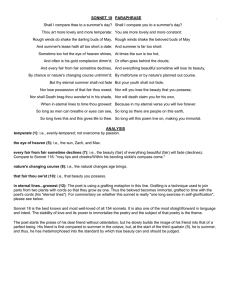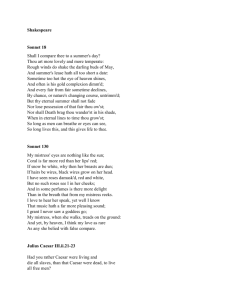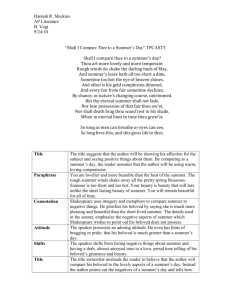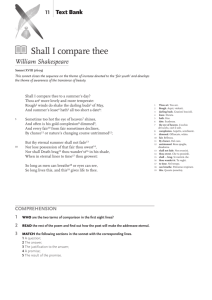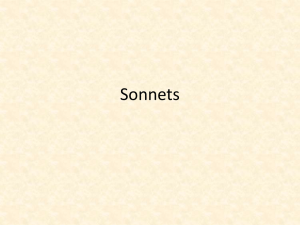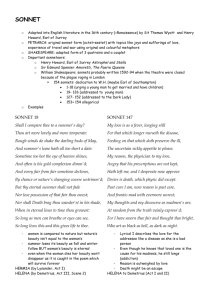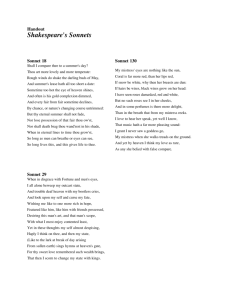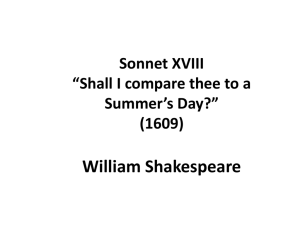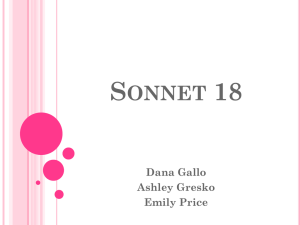Sonnet 18 (Shakespeare) - English With Mrs Laufs
advertisement
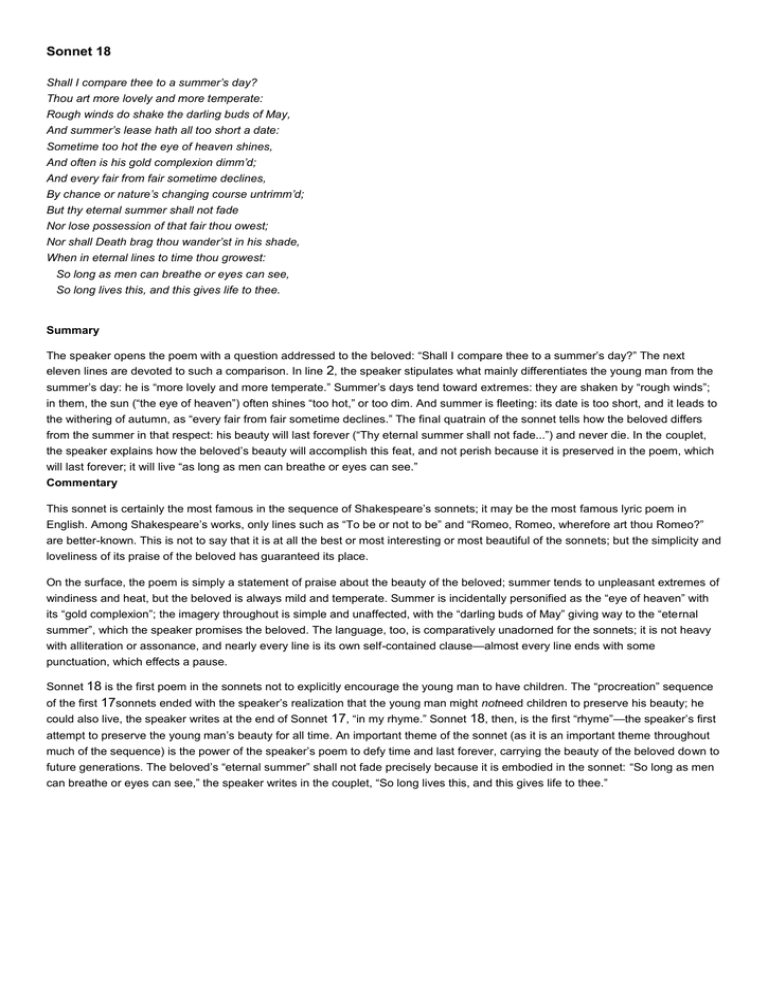
Sonnet 18 Shall I compare thee to a summer’s day? Thou art more lovely and more temperate: Rough winds do shake the darling buds of May, And summer’s lease hath all too short a date: Sometime too hot the eye of heaven shines, And often is his gold complexion dimm’d; And every fair from fair sometime declines, By chance or nature’s changing course untrimm’d; But thy eternal summer shall not fade Nor lose possession of that fair thou owest; Nor shall Death brag thou wander’st in his shade, When in eternal lines to time thou growest: So long as men can breathe or eyes can see, So long lives this, and this gives life to thee. Summary The speaker opens the poem with a question addressed to the beloved: “Shall I compare thee to a summer’s day?” The next eleven lines are devoted to such a comparison. In line 2, the speaker stipulates what mainly differentiates the young man from the summer’s day: he is “more lovely and more temperate.” Summer’s days tend toward extremes: they are shaken by “rough winds”; in them, the sun (“the eye of heaven”) often shines “too hot,” or too dim. And summer is fleeting: its date is too short, and it leads to the withering of autumn, as “every fair from fair sometime declines.” The final quatrain of the sonnet tells how the beloved differs from the summer in that respect: his beauty will last forever (“Thy eternal summer shall not fade...”) and never die. In the couplet, the speaker explains how the beloved’s beauty will accomplish this feat, and not perish because it is preserved in the poem, which will last forever; it will live “as long as men can breathe or eyes can see.” Commentary This sonnet is certainly the most famous in the sequence of Shakespeare’s sonnets; it may be the most famous lyric poem in English. Among Shakespeare’s works, only lines such as “To be or not to be” and “Romeo, Romeo, wherefore art thou Romeo?” are better-known. This is not to say that it is at all the best or most interesting or most beautiful of the sonnets; but the simplicity and loveliness of its praise of the beloved has guaranteed its place. On the surface, the poem is simply a statement of praise about the beauty of the beloved; summer tends to unpleasant extremes of windiness and heat, but the beloved is always mild and temperate. Summer is incidentally personified as the “eye of heaven” with its “gold complexion”; the imagery throughout is simple and unaffected, with the “darling buds of May” giving way to the “eternal summer”, which the speaker promises the beloved. The language, too, is comparatively unadorned for the sonnets; it is not heavy with alliteration or assonance, and nearly every line is its own self-contained clause—almost every line ends with some punctuation, which effects a pause. Sonnet 18 is the first poem in the sonnets not to explicitly encourage the young man to have children. The “procreation” sequence of the first 17sonnets ended with the speaker’s realization that the young man might notneed children to preserve his beauty; he could also live, the speaker writes at the end of Sonnet 17, “in my rhyme.” Sonnet 18, then, is the first “rhyme”—the speaker’s first attempt to preserve the young man’s beauty for all time. An important theme of the sonnet (as it is an important theme throughout much of the sequence) is the power of the speaker’s poem to defy time and last forever, carrying the beauty of the beloved down to future generations. The beloved’s “eternal summer” shall not fade precisely because it is embodied in the sonnet: “So long as men can breathe or eyes can see,” the speaker writes in the couplet, “So long lives this, and this gives life to thee.” SONNET 18 PARAPHRASE Shall I compare thee to a summer's day? Shall I compare you to a summer's day? Thou art more lovely and more temperate: You are more lovely and more constant: Rough winds do shake the darling buds of May, Rough winds shake the beloved buds of May And summer's lease hath all too short a date: And summer is far too short: Sometime too hot the eye of heaven shines, At times the sun is too hot, And often is his gold complexion dimm'd; Or often goes behind the clouds; And every fair from fair sometime declines, And everything beautiful sometime will lose its beauty, By chance or nature's changing course untrimm'd; By misfortune or by nature's planned out course. But thy eternal summer shall not fade But your youth shall not fade, Nor lose possession of that fair thou owest; Nor will you lose the beauty that you possess; Nor shall Death brag thou wander'st in his shade, Nor will death claim you for his own, When in eternal lines to time thou growest: Because in my eternal verse you will live forever. So long as men can breathe or eyes can see, So long as there are people on this earth, So long lives this and this gives life to thee. So long will this poem live on, making you immortal. ANALYSIS temperate (1): i.e., evenly-tempered; not overcome by passion. the eye of heaven (5): i.e., the sun. every fair from fair sometime declines (7): i.e., the beauty (fair) of everything beautiful (fair) will fade (declines). Compare to Sonnet 116: "rosy lips and cheeks/Within his bending sickle's compass come." nature's changing course (8): i.e., the natural changes age brings. that fair thou ow'st (10): i.e., that beauty you possess. in eternal lines...growest (12): The poet is using a grafting metaphor in this line. Grafting is a technique used to join parts from two plants with cords so that they grow as one. Thus the beloved becomes immortal, grafted to time with the poet's cords (his "eternal lines"). For commentary on whether this sonnet is really "one long exercise in self-glorification", please see below.
